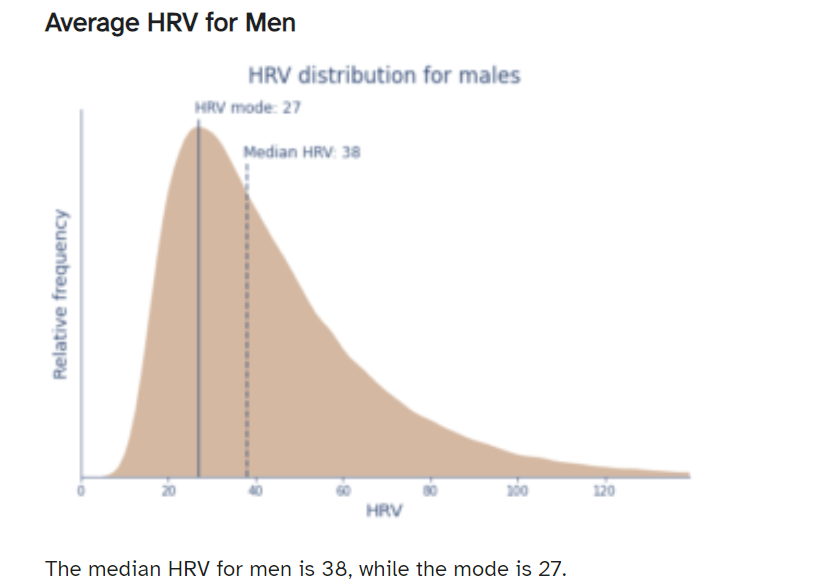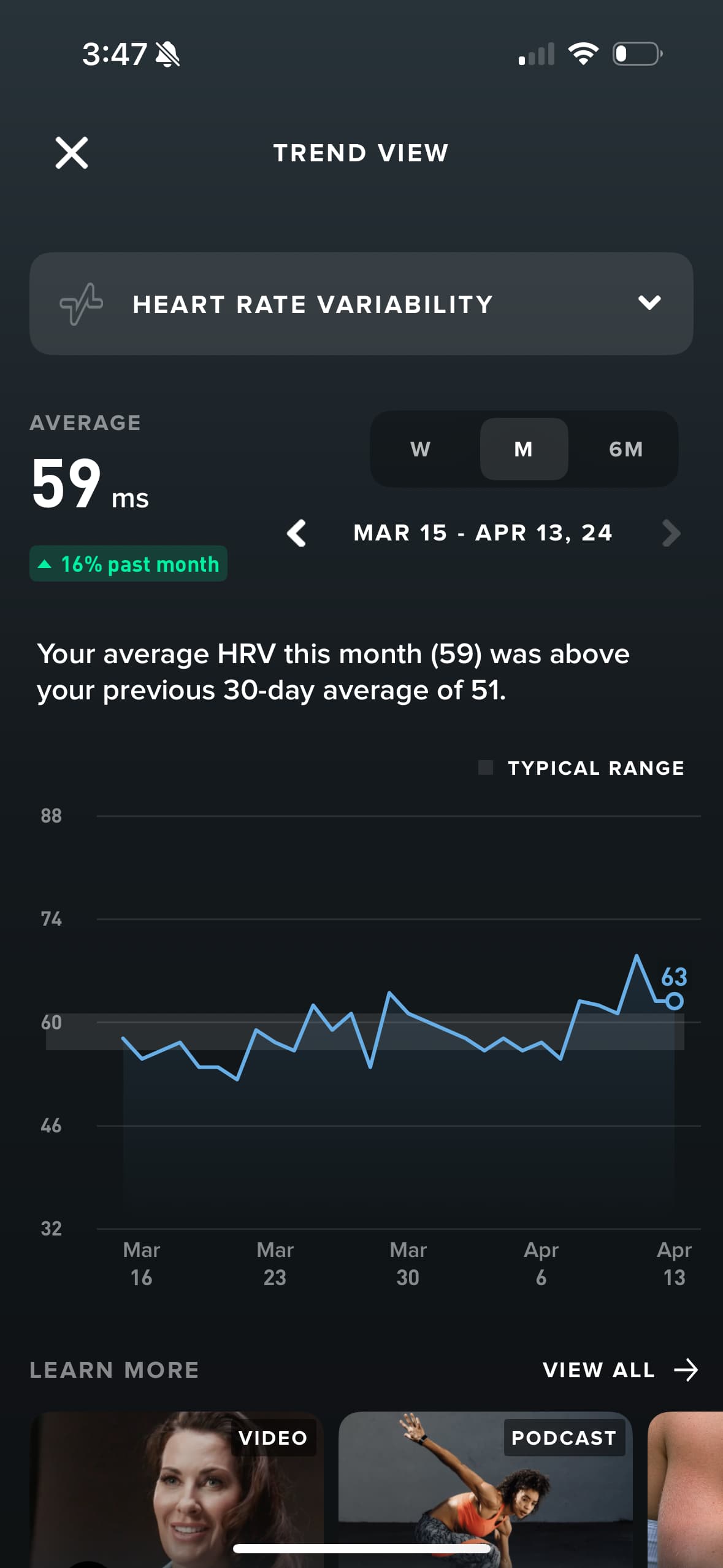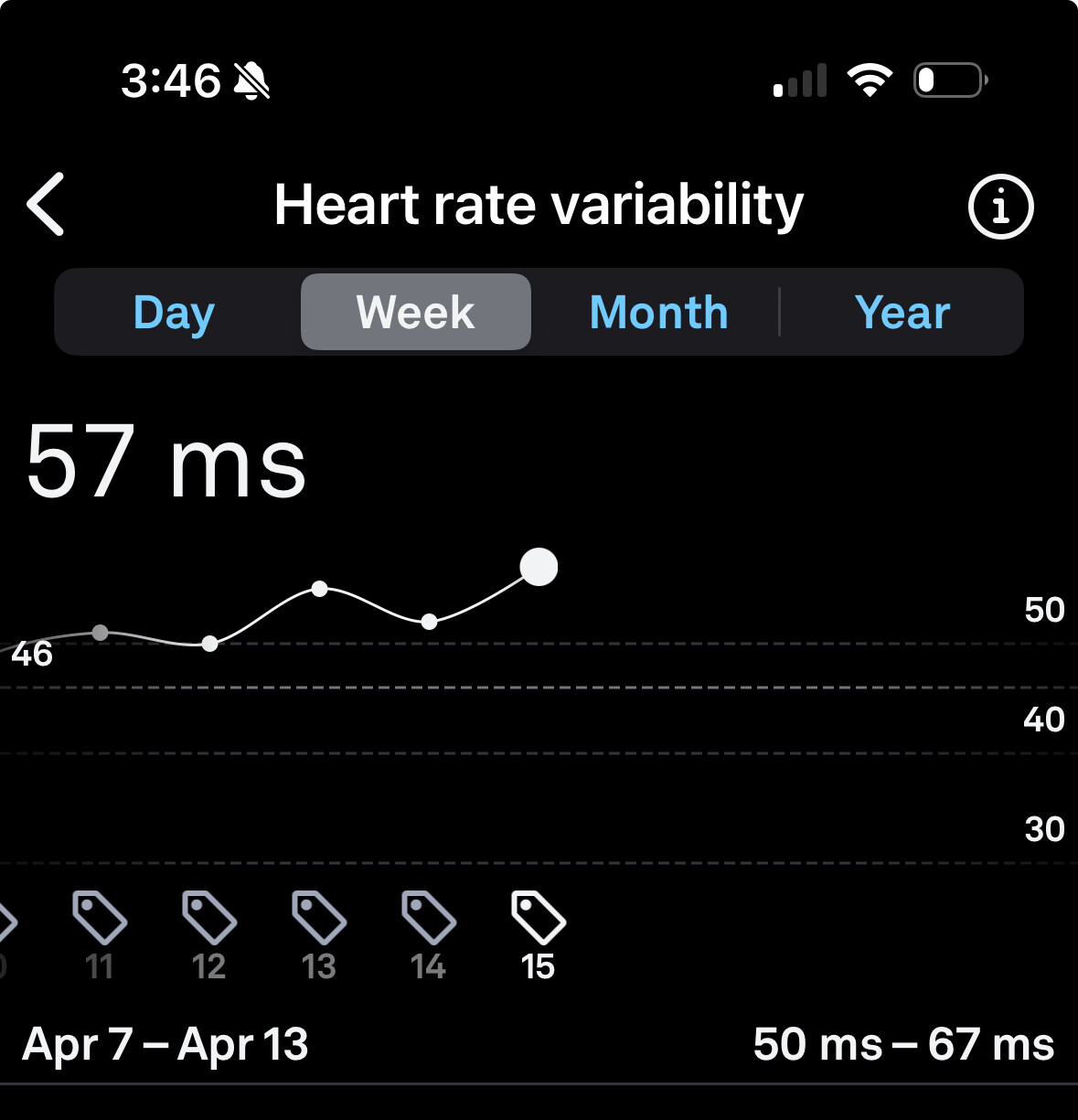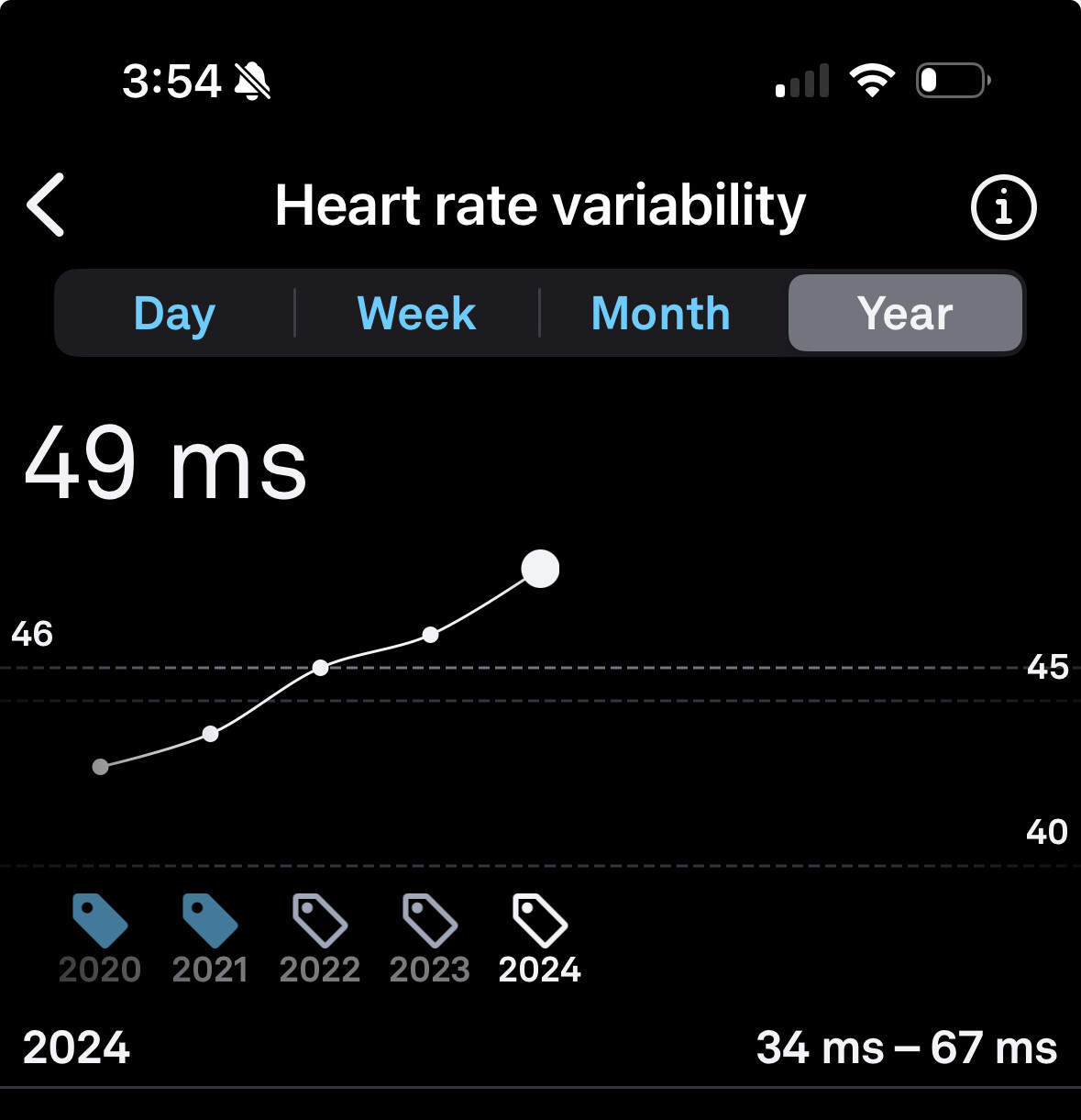Mine is in the 20s and 30s (always been). I don’t know what changes it, but it’s it’s not casual (only associative) so I never really care
How are you measuring it?
Oura seems to underestimate for instance compared to other ways
And wrist m/are measurements are not as accurate as chest strap
Mine is 30 on average. Sometimes jumps over 100 and sometimes fall to 20. Also cannot figure out what is tha cause.
Yeah, my Oura ring will report low 20s but Polar H10 with Elite HRV will report upper 40s-low 50s. Still below average for my age.
Alex, it seems like you may want to exercise more…
the two key reasons you should care about your HRV number are:
- Changes in the HRV baseline (a rolling average of daily measures) correlate with changes in athletic performance and may even predict future performance changes following a training block (Buchheit et al., 2009 and Flatt & Esco, 2015)
- HRV baseline numbers tell a story about your prospects for healthy longevity. HRV measures the activity of the parasympathetic branch of the autonomic (unconscious) nervous system (ANS), which decreases during aging, and dysfunction of the ANS underlies cardiovascular and other age-related inflammatory diseases, such as type 2 diabetes (Jandackova et al. 2019) which is why it is such a great indicator of health.
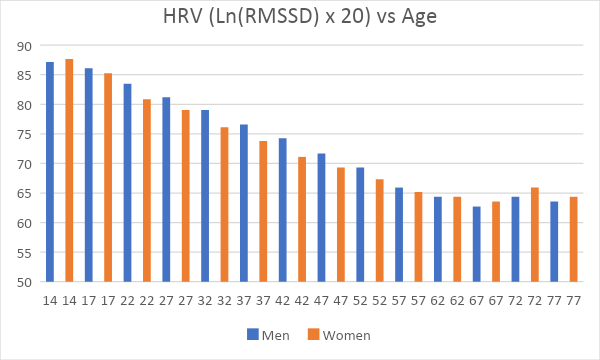
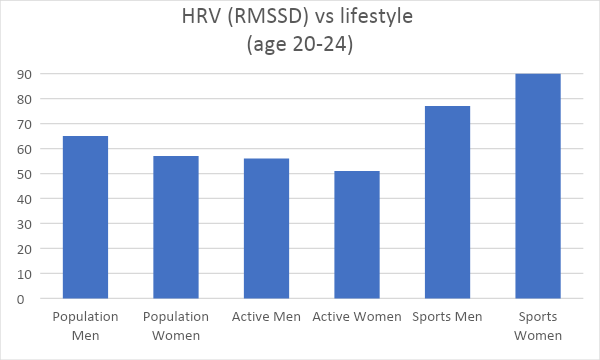
Masters Athletes (Masters athletes had an average age of 51 years)
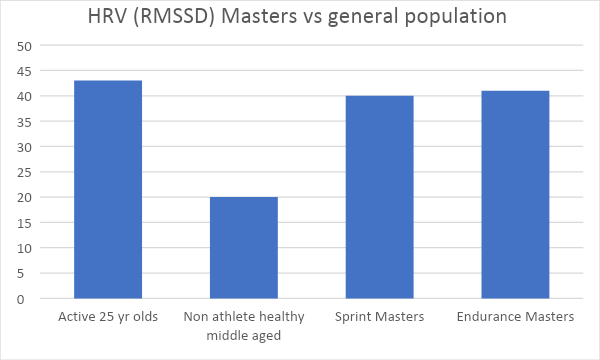
Source:
I’ve used a HeartMath device (Technology Products - HeartMath Store…) to reliably raise my HRV for years.
Alan Watkins gave a 2 part TEDx talk on actively raising one’s HRV through a combination of breathing and biofeedback years ago. YouTube videos of the talks follow:
- https://www.youtube.com/watch?v=q06YIWCR2Js (Part 1)
- https://www.youtube.com/watch?v=Q_fFattg8N0 (Part 2)
If memory serves Watkins worked with HeartMath for some time and may still. HeartMath incorporated some of his biofeedback displays into their software.
Spending 5 minutes in what Watkins and HeartMath call “coherence” can significantly raise one’s HRV and once raised it can stay raised for sometime (raising it has a long half-life;-)
The software and devices provide biofeedback that enables one to pretty easily get into the coherence state as one synchronizes one’s breathing.
I find the bio feedback (both visual and auditory) more effective and efficient than other things that can raise HRV (meditation, listening to soothing or meditative music, e.g., Bach’s Goldberg Variations works for me).
When I do it regularly:
- my Oura Ring registers regular high HRV readings,
- I sleep better, and
- I find that things don’t shake me during the day (best evidence… I don’t fight with my wife).
Higher HRV affects lots of things, but I find its ability to enable one’s awareness of and even some significant modicum of control of fight | flight responses or more specifically cortisol | adrenaline release, does pretty extraordinary things.
Higher HRV doesn’t prevent one fight or flight responses, which we need to survive, but it does bring them within our capacity to have them rather than them having us.
Why worry about low HRV when one can pretty simply biohack it and realize the benefits?
Make sure the measurement is reliable before worrying. My HRV is reduced by alcohol but i like being drunk. Hence i will live with around 60 on polar/elite.
Make sure you are comparing the same metric across devices. HRV refers to many metrics. Elite HRV has its own “index” to make the numbers “more meaningful “!
If you’re using an oura ring, you should read this:
The OR measures HRV while you’re sleeping, whereas the rapadmin-linked article recommends
‘Readings taken at the same time every day (ideally just after waking)…Keep to the same body position (standing for elite athletes, otherwise sitting)…Follow paced breathing (7-10 Br/min for athletes)’
When I had an OR my HRV numbers were all like this:
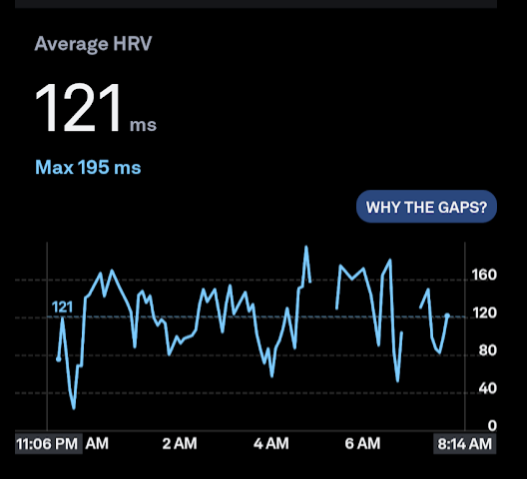
Put me down as a HRV denier. This website gives you a 1,001 opportunities to find something to obsess over, pick something else. ![]()
Below, we’ll see the range of HRV scores across Oura members by age and gender.
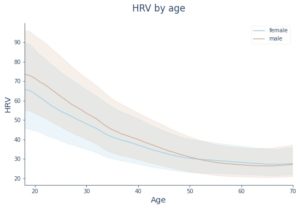
As this chart shows, the general takeaway is that HRV is much higher for younger people than older people. Multiple, population-based research studies confirm that HRV tends to decline with age. Some researchsuggests that this decline likely reflects the normal aging process. Other studies show this decline in HRV may be less severe the healthier the person is. “With the right lifestyle and genes, there can be a lower reduction or higher values because they had a higher HRV over their lifespan,” Altini explains. (See below for healthy lifestyle habits that can help improve your HRV.)
—
Heart rate variability as a marker of healthy ageing
Conclusion: These findings suggest that an age-related decline in HRV is not inevitable. Longitudinal designs exploring within-individual changes in cardiac vagal tone are required to better understand the factors contributing to healthy ageing.
I don’t disagree with Len on this, but it does seem to reflect general health at some level, though not with much granularity:
the following heart rate variability chart, from a 2020 study on Fitbit data from 8 million users3’ smartwatch data. (Note: RMSSD is equivalent to HRV.)
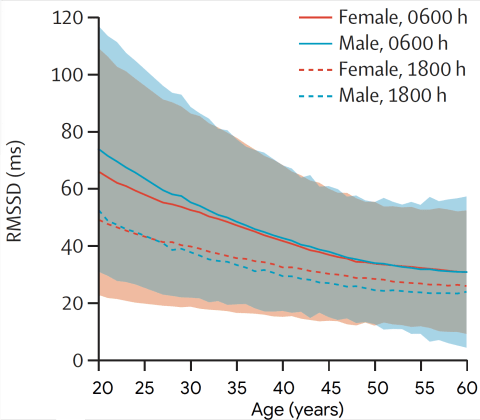
Heart rate variability by age chart, via The Lancet
Image by The Lancet/ Fitbit
As you can see, HRV measurements decrease most rapidly between the ages of 20 and 40 and then even out. (Separate research has found that those who reach 100 years old tend to experience another rapid dip in HRV4, due mostly to a quick decrease in parasympathetic activity.) This chart also shows that men tend to have a higher HRV than females until the age of 50, after which there are no sex differences. Genetics also play a significant role in your HRV score, as shown by research on twins5. Conditions like cardiac arrhythmia can also affect HRV readings, as can hormonal changes due to menstruation6, pregnancy7, and menopause8.
Source: A Heart Rate Variability Chart By Age & How To Raise Your HRV | mindbodygreen
Same paper says
HRV seems to play a role in exceptional longevity, which could be accounted for by centenarians’ exposome.
Not sure about the quality of this source:
According to Bryan Johnson, HRV (heart rate variability) is critical to his anti-aging and longevity efforts through his Blueprint project. The entrepreneur and biohacker has been focused on increasing his HRVas part of his health regimen.
He started with an average HRV in the low 30 ms range, which he attributed to the stress of 20 yearsworking as an entrepreneur and parenting.
Through consistent effort and lifestyle changes, Bryan has increased his average HRV into the low 60 ms range over two years.
Based on HRV age calculators, this increase in HRV corresponds to a 12 year age reversal.
What is your current HRV and what are three things you are doing to increase it?
@len5742 Might be more valuable to look at an individuals trends vs themself vs between individuals, but for what’s it’s worth
My HRV has most recently been in the high 50s, low 60s
For context I’ll soon be 46 yrs.
Whoop:
Oura:
Three things:
-
Generally good zone 2/resistance training regime, but not overdoing it
-
Try to find mindfulness on a daily basis
-
Tech: Use Pulsetto almost daily, got a massage chair and use it a couple of times a week
I started at a lower basis when I began measuring and was more stressed out in general
Marco Altini is the master of HRV. In this interview he explains what’s real and what’s not.
What is your current HRV and what are three things you are doing to increase it?
Congratulations!
Keep it up, you’re almost half way to 121. ![]()
I shouldn’t feel it necessary to do any of the those three things, right?
For context, I’ll soon be 72.
@len5742 With regards to this metric you may want to look at your trend and have it go upwards/or at least flat and not downward (in any stream way). Comparing to yourself might be most helpful.
What has your trend looked like?
I’m not sure what an outlier result as yours means, but hopefully it’s good (you might want to research it further though). Have you measured it with some other device that one specific oura ring?
—
As others have said elsewhere on the forum, this is only one measurement and you of course want to optimize things holistically.
Actually Watkins and HeartMath parted company because Heart Math was getting more spiritual and less scientific. He set up his own company in the UK. The vagus nerve works in both directions so impulses that begin in the brain can affect the heart (fight or flight) the opposite is also true, with the heart sending messages to the brain via the vagus nerve. You can control this process (and increase your HRV) by slowing your breathing rate and there are apps like Elite HRV providing biofeedback. A biofeedback course was first used by Russian cosmonauts to improve their mental state and the guy who designed the program came to Rutgers in US. Here is his detailed program:
